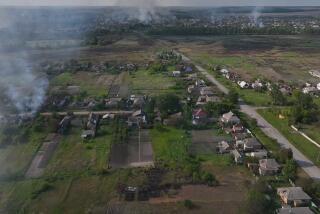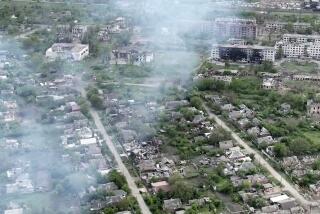Russian Troops Run Amok in Grozny, Chechens Say
- Share via
GROZNY, Russia — Raisa was sitting in the back seat of the car waiting for her husband to buy a loaf of bread when Russian soldiers drove an armored personnel carrier over the back end of the flimsy little sedan.
The Chechen woman escaped injury only because she was leaning forward, resting her arms on the front seat. Every scrap of metal behind her was mangled. When outraged bystanders fetched journalists to the scene shortly after the incident Saturday, Raisa was so stunned that she could barely give her first name, let alone explain what had happened.
Her husband went off to Russian military headquarters to complain. But none of the angry witnesses held out the slightest hope that the rampaging soldiers would be punished.
Russian officials in three government agencies had no comment Tuesday.
Six weeks after Russian forces captured this capital of the secessionist republic of Chechnya, the victors are running wild through the rubble-strewn streets, civilians say.
Officials of the Chechen government recently installed by Moscow--a government that has been widely accused of being a Kremlin puppet--now echo the complaints. They say drunken and abusive Russian soldiers have become an obstacle to restoring law and order in Grozny.
“Four looters have been shot in this city--but only four,” said Beslan Gantemirov, the newly reinstalled mayor of Grozny. “It should have been 4,000 or 40,000, because all the (Russian) troops that have entered Grozny, without exception, have been looting.”
If Russian military commanders do not discipline their lawless soldiers, Gantemirov warned, Chechen vigilantes may soon do it for them.
Coming from one of rebel Chechen President Dzhokar M. Dudayev’s archenemies, these were startling words.
As Grozny’s first elected mayor, Gantemirov helped bring Dudayev to power in 1991. But he joined the anti-Dudayev opposition after troops loyal to the president fired on demonstrators in 1993, and Dudayev ousted him as mayor.
Gantemirov and other opposition leaders later enlisted Russian help in overthrowing the Dudayev regime.
In a blistering interview Saturday, Gantemirov said the struggle to topple “Dudayev’s fascism” and the “gangsters” who supported the Chechen leader had brought no relief to the Chechen people.
“Instead of one fascism, we now have another fascism,” he said.
Signaling that the bickering, powerless and so far ineffectual opposition leaders may henceforth prove less compliant than the Kremlin might expect, Gantemirov added: “Russia has to decide now who it wants to fight: the Dudayevites or us.”
As Gantemirov spoke, a massive Russian offensive was under way against the village of Samashky, about 30 miles southwest of Grozny. Refugees fleeing the besieged town have accused Russian forces of massacring civilians and setting some of them ablaze.
“Many, many bodies are still littering the town,” Jean-Paul Corboz of the International Committee of the Red Cross told the Reuters news agency.
A Russian military spokesman said more than 130 Chechen fighters were killed and 124 were injured in the battle. Neither those figures nor the civilian casualties could be confirmed.
On Tuesday, four months after Russian President Boris N. Yeltsin ordered troops into the breakaway Muslim republic, Russian forces were reportedly bombarding other southwestern villages.
During the relentless bombing of Grozny in January, more than 300,000 people are believed to have fled the city for the surrounding countryside or neighboring republics. Now that Russian forces have driven rebel Chechen fighters into the Caucasus Mountains and begun intensive bombing there, many refugees have started fleeing back to Grozny.
“They’ve been bombing us for a week; yesterday they bombed five or six times,” said Luisa Magamadova, 31. She was crammed into a car with her mother, three children and two other relatives for a frightening trip from the mountain village of Shatoi down to Grozny through territory being shelled by Russian forces. The Grozny apartment she fled in January is now a pile of bomb debris, but Magamadova said she no longer cares.
“We can live on the street if we have to, just so long as there’s no shooting,” Magamadova said.
The refugees are returning to a city with no electricity, no gas, no running water and long lines at every well and water truck. Nearly every building still standing has a blown-out roof, a scorched side or a gaping puncture.
Those who drive into Grozny from the west are reminded instantly that although the battle for the capital is over, the rebels’ war against the Russian “occupiers” is not.
“Death to Russian soldiers!” reads the graffito on the wall of a pulverized oil refinery. “Jackals, you will not be safe from the wolves,” it says. The wolf is the symbol of the anti-Russian fighters.
Once the exhausted refugees reach the Russian checkpoints on the outskirts of the city, they often have to wait in line for hours to gain admission. At 7:30 one morning last week, 186 cars were lined up waiting for soldiers to begin their painstaking search of each car for hidden weapons and fighters trying to pass themselves off as civilians.
The checkpoint was supposed to open when curfew lifted at 6 a.m., but the people in line said they had been told that the checkpoint would not open until two hours later. No explanation was offered.
“They let you go when they want, and they make you wait when they want,” said Gelani Didayev, 38. “The people with the guns give the orders.”
Larissa Usmanova returned to her home on Kirov Street to find glorious apricot trees blooming around four smashed walls.
While her family was gone, rebel fighters apparently took up sniper positions in her house; Russian forces ousted them by shelling the neighborhood to shards. Kirov Street residents said every house that escaped bombing was looted.
In the garden where Usmanova’s children played, someone had burned several corpses. A woman’s wristwatch lay near a pile of ashes that stank of gasoline and worse.
Next door, a man’s body could be seen through a gaping hole in the ground that used to be a basement. Usmanova’s family had been trying for three days to get someone to come remove it.
On the other side of Usmanova’s bullet-studded walls, Russian soldiers had spray-painted a tribute to two comrades who died fighting there and stuck a bouquet of daffodils into the end of a grenade launcher.
Someone removed the flowers in a silent protest, Usmanova said. But the soldiers came back and beat up several neighborhood children in retaliation. Since then the flowers have stayed put.
The 31-year-old mother of four is now living in a neighbor’s basement with 16 other homeless people. None of them have a job.
“There are people here whose children have lost arms and legs in the bombing,” said her brother-in-law, Adlan Usmanov. “If the Russians think we’re going to forgive them now, they are mistaken.”
More to Read
Sign up for Essential California
The most important California stories and recommendations in your inbox every morning.
You may occasionally receive promotional content from the Los Angeles Times.










